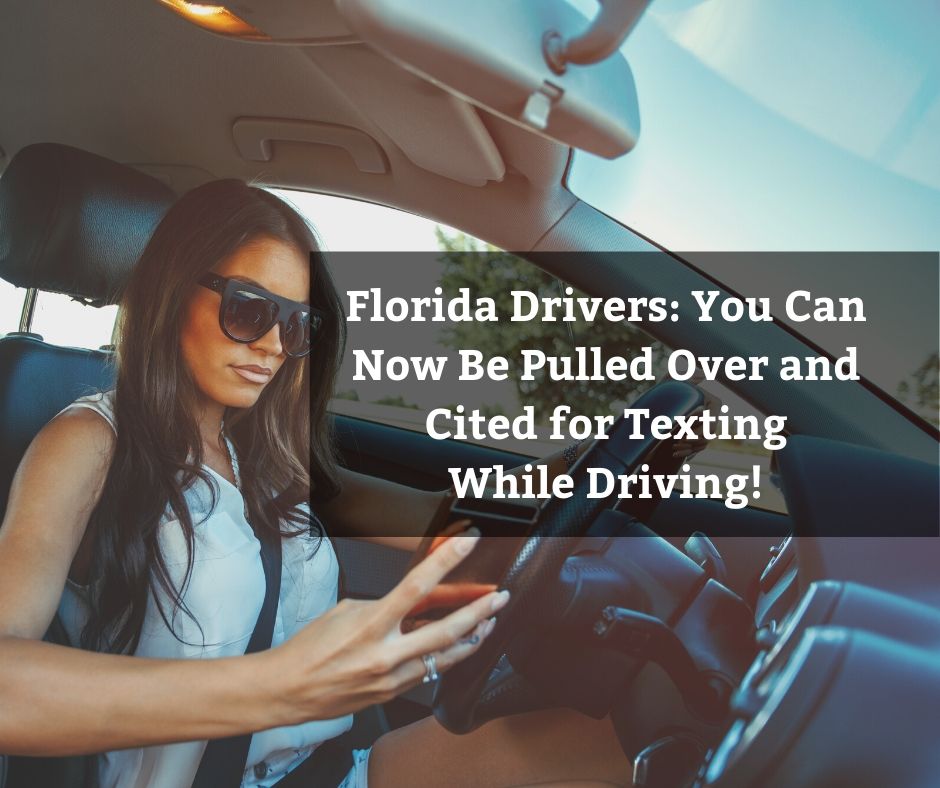
Last year, we published a blog post giving you all the details you needed to know about the new law that Governor DeSantis signed about distracted driving and texting while driving for the state.
Be sure to check that link out if you missed it! While the law was signed midway through last year, it has not been enforced to the full extent of the law until yesterday, January 1st. In this blog post, we’ll review what the law means for you and what the enforcement will look like in the new year.
A Quick Overview of the Texting While Driving Law
Prior to last year, texting while behind the wheel was a secondary offense in our state. This meant that if a police officer saw you using your phone while driving, they were unable to pull you over and ticket you for that violation alone. You would have to commit a primary traffic offense to be pulled over. At that point, the officer would be able to cite you for texting while driving and the other offense you committed.
Why does that matter? Millions of Americans admit to driving while using their phone. We know that it’s a dangerous activity, but it was incredibly difficult to enforce under the prior laws. The new law signed last year elevates texting while driving to a primary offense. If a police officer sees you using your phone while driving, that’s the only reason they need now to pull you over and write you a ticket.
It’s Time to Enforce the Law
After the law was signed last year, state law enforcement was in a grace period for the remainder of the year. While police officers were able to pull people over, they were issuing warnings to motorists until January 2020. Now that Floridians have had six months to be made aware of the law, the grace period is over. If you’re seen by a law enforcement officer using your phone while driving, you can be pulled over and issued a citation for that offense alone.
Besides texting while driving, you’re no longer allowed to talk on your cell phone in work or school zones. The only exception to this is through the use of “hands-free” devices, such as Bluetooth in your car. You’ve been warned, don’t let yourself be cited!
The Finer Details of the Texting While Driving Law
You probably have some questions for how the law might affect you, so we’re here to help you with those. Here are a list of questions and answers we’ve compiled for you to make the transition period a little bit easier:
- Am I allowed to use my phone for texting while I’m stopped?
Yes. The law bars you from texting or using your smartphone while your car is in motion. If you’re stopped at a traffic light or waiting in traffic, you can use your phone. Your car just can’t be moving or impeding traffic while you use it. For your safety, we still recommend you wait until you’ve reached your destination to do any texting! - Am I allowed to hold my phone still while I’m on a call?
In most cases, yes. However, as we mentioned above, this is not allowed if you are in a school or work zone at the time of your call. If you are coming up on one of those zones and don’t have your calls set to a hands-free device, you’ll need to make sure you end the call before you enter them. - How much are the tickets/fines for violating the law?
For the first offense, you’ll be issued a $30 fine. If you violate the law again within five years, you’ll be issued a $60 fine. When you include court costs, those fines jump up in price quite a bit. - Can a police officer take my phone to check if I was texting?
No. Police are not allowed to take or confiscate your phone for a traffic stop. That being said, officers are trained to notice the signs of someone who is texting on their phone while driving vs. using their phone for something allowed like GPS. - Can I use Apple/Google/Waze for maps and directions?
Yes. Under the law, you are allowed to use your smartphones for GPS/maps usage while behind the wheel. Keep in mind, texting is not the only distraction your phone can bring while driving. Even though you’re allowed to use your phone for maps and directions, make sure you’re setting everything up before you start on your trip and that you aren’t taking your eyes off the road whenever you can help it. Watching your phone for maps directions can be just as distracting as texting.
Contact the Brooks Law Group
As personal injury attorneys in Florida, it’s impossible for us to overlook the danger that distracted driving and texting while driving brings. On a daily basis, we work with clients who have had their lives impacted by car, truck and motorcycle accidents. Many of these clients were seriously injured because another driver chose to focus on their phones instead of the road ahead. As we get to know our clients on a personal level, we also see the devastation that just a few seconds of inattention can have on somebody’s life. That’s why we spend so much time focusing on the dangers and consequences that distracted driving brings.
If you or a loved one has been injured by a distracted driver, we’re here for you. Navigating the legal process can be an overwhelming task, and that’s where a car accident law firm can step in to shoulder the weight of arguing your case, whether that’s with an insurance company or in the Florida courts. We’re dedicated to making sure you receive the medical treatment and compensation that your case deserves.
Our offices are available 24/7 to discuss your case with you. If we don’t recover compensation for your case, then you don’t owe us anything. That’s why our case results are so important to us. To have an attorney give you a free case evaluation, you can call our offices at 1-800-LAW-3030 (800-529-3030) or fill out our online Contact Us form located on the top right of your screen. Don’t wait, call us today!













